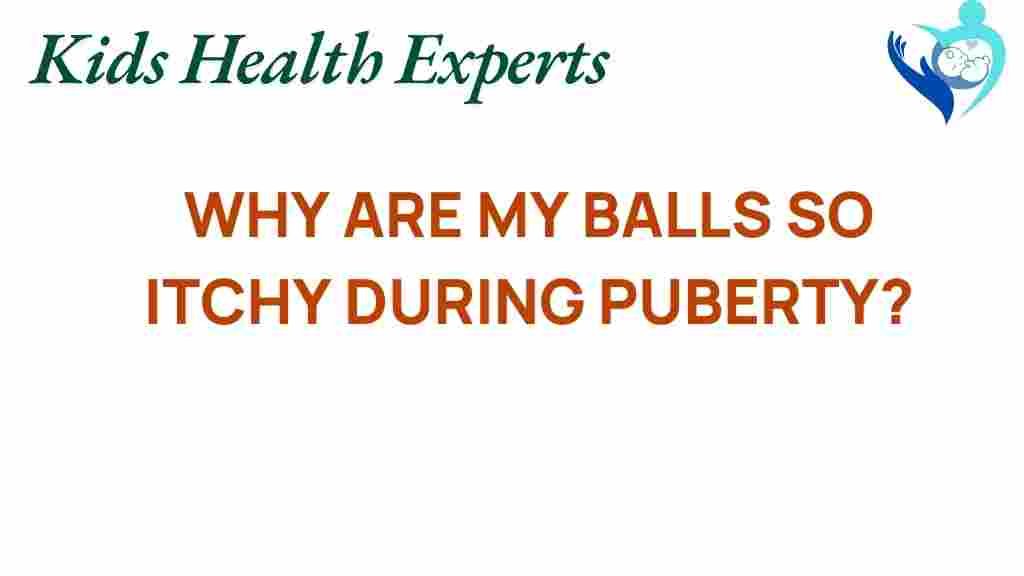The Surprising Truth Behind Itchy Balls During Puberty
Puberty is a significant phase of development in a young man’s life, marked by various body changes and new experiences. While many people are aware of the more visible changes like growth spurts and voice deepening, they might not consider the less talked about issues, such as itching in the genital area. This article delves into the surprising truth behind itchy balls during puberty, exploring the causes, concerns, and the importance of personal hygiene and skincare during adolescence.
Understanding Puberty and Its Impact on Male Health
Puberty typically begins between the ages of 9 and 14 for boys and involves a series of physical and hormonal changes. These changes can lead to various common concerns, including itching and discomfort in sensitive areas. Understanding the connection between puberty and male health is essential for addressing these issues effectively.
Common Causes of Itching During Adolescence
Itching in the genital area can result from several factors, especially during the tumultuous years of puberty. Here are some of the most common causes:
- Hormonal Changes: Fluctuations in hormones can lead to increased sweat production and changes in skin texture, making the area more prone to itching.
- Personal Hygiene: During puberty, young men may not yet have established a consistent personal hygiene routine, leading to the buildup of sweat and bacteria.
- Skin Irritation: The skin in the genital area is sensitive and can react to various irritants, including soaps, laundry detergents, or fabric softeners.
- Fungal Infections: Conditions like jock itch, caused by fungi, are more common during puberty due to increased moisture and friction.
- Pubic Hair Growth: As hair grows in the pubic area, it can create friction and irritation, leading to itching.
- Allergic Reactions: Allergies to certain products, like soaps or lotions, can also cause itching.
Step-by-Step Guide to Managing Itchy Balls During Puberty
If you’re experiencing itching during puberty, here’s a step-by-step guide to help manage the discomfort:
Step 1: Maintain Proper Personal Hygiene
Establishing a regular bathing routine is crucial:
- Shower daily using mild, unscented soap.
- Gently wash the genital area to remove sweat and bacteria.
- Pat the area dry with a clean towel to prevent moisture buildup.
Step 2: Choose the Right Clothing
What you wear can significantly impact your comfort:
- Opt for breathable fabrics like cotton that allow for airflow.
- Avoid tight-fitting underwear, which can increase friction and moisture.
- Change out of sweaty clothes promptly after sports or exercise.
Step 3: Use Skin Care Products Wisely
Choosing the right products can minimize irritation:
- Use hypoallergenic and fragrance-free soaps and lotions.
- If you’re prone to fungal infections, consider antifungal powders.
- Consult a doctor before using any new products on sensitive areas.
Step 4: Monitor for Signs of Infection
If itching persists, watch for additional symptoms:
- Redness or swelling in the area.
- Unusual discharge or odor.
- Persistent pain or discomfort.
If any of these symptoms occur, it’s essential to seek medical advice.
Troubleshooting Common Concerns
As you navigate through puberty, here are some troubleshooting tips for common concerns regarding itching:
What If It’s a Fungal Infection?
Fungal infections, like jock itch, can be itchy and uncomfortable. If you suspect a fungal infection:
- Apply an over-the-counter antifungal cream, following package instructions.
- Keep the area clean and dry.
- If symptoms do not improve within a week, consult a healthcare provider.
When to See a Doctor
While some itching is normal, certain signs warrant a visit to a doctor:
- If itching is severe and persistent.
- Accompanied by pain or swelling.
- Signs of infection or unusual discharge.
It’s always better to err on the side of caution when it comes to your health.
Conclusion: Embracing Change During Adolescence
Itchy balls during puberty can be a surprising and uncomfortable experience for many young men. However, understanding the causes and implementing proper personal hygiene and skincare can alleviate discomfort and promote overall male health. Remember, puberty is a time of significant change, and addressing common concerns like itching is a vital part of growing up. If you ever feel unsure or concerned about your health, don’t hesitate to talk to a trusted adult or healthcare provider.
For more information on male health and personal hygiene during puberty, check out this comprehensive guide on teenage health. Additionally, for more insights into skin care and managing adolescent changes, visit this valuable resource.
This article is in the category Conditions and created by KidsHealthExperts Team
